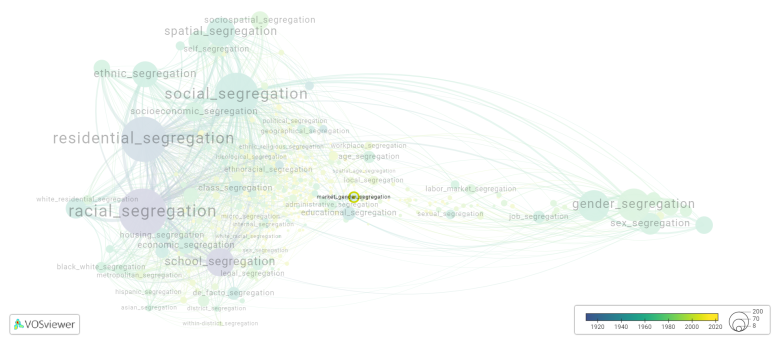Market gender segregation: Difference between revisions
(Creating page) |
(Creating page) |
||
| (2 intermediate revisions by the same user not shown) | |||
| Line 12: | Line 12: | ||
While market gender segregation can be based on assumptions and stereotypes, some argue that it is a valid marketing strategy that considers the varying preferences and needs of different demographics. However, others argue that it reinforces harmful gender stereotypes and limits individuals' freedom of choice. There is ongoing debate and discussion about the merits and effects of gender segregation in the market. | While market gender segregation can be based on assumptions and stereotypes, some argue that it is a valid marketing strategy that considers the varying preferences and needs of different demographics. However, others argue that it reinforces harmful gender stereotypes and limits individuals' freedom of choice. There is ongoing debate and discussion about the merits and effects of gender segregation in the market. | ||
===== Synonyms ===== | ===== Synonyms ===== | ||
The following terms are synonymous with: | The following terms are synonymous with market gender segregation: | ||
market gendered segregation. | market gendered segregation. | ||
| Line 24: | Line 24: | ||
[[File:market_gender_segregation.png|780x780px]] | [[File:market_gender_segregation.png|780x780px]] | ||
This visualization is based on the study [[Segregation_Wiki:About| The Multidisciplinary Landscape of Segregation Research]]. | |||
For the complete network of | For the complete network of interrelated segregation forms, please refer to: | ||
* [https://tinyurl.com/2235lkhw First year of publication] | |||
* [https://tinyurl.com/2d8wg5n3 Louvain clusters] | |||
* [https://tinyurl.com/223udk5r Betweenness centrality] | |||
* [https://tinyurl.com/244d8unz Disciplines in which segregation forms first emerged (Scopus database).] | |||
==References== | ==References== | ||
==Notes== | ==Notes== | ||
Latest revision as of 07:17, 16 October 2024
Date and country of first publication[1][edit | edit source]
2014
France
Definition[edit | edit source]
Gender segregation in the market refers to the division of products, services, and marketing strategies based on the perceived preferences and needs of specific genders. This can result in the creation of separate markets for men and women, where certain products or services are targeted exclusively towards one gender.
One example of market gender segregation is the separation of clothing and fashion lines. Many retailers and brands have distinct sections for men's and women's clothing, with different styles, designs, and marketing approaches. This practice assumes that specific genders have unique preferences when it comes to fashion and that they should be catered to separately.
Another example is the marketing of toys and games. Toy manufacturers often create gender-specific toys, such as dolls and cooking sets for girls and action figures and construction sets for boys. This type of gendered marketing perpetuates stereotypes about what is considered appropriate for each gender, limiting children's choices and reinforcing gender norms.
While market gender segregation can be based on assumptions and stereotypes, some argue that it is a valid marketing strategy that considers the varying preferences and needs of different demographics. However, others argue that it reinforces harmful gender stereotypes and limits individuals' freedom of choice. There is ongoing debate and discussion about the merits and effects of gender segregation in the market.
Synonyms[edit | edit source]
The following terms are synonymous with market gender segregation:
market gendered segregation.
References and literature addressing this segregation form under these synonymous terms can be found below.
See also[edit | edit source]
Related segregation forms[edit | edit source]
Market gender segregation is frequently discussed in the literature with the following segregation forms:
This visualization is based on the study The Multidisciplinary Landscape of Segregation Research.
For the complete network of interrelated segregation forms, please refer to:
References[edit | edit source]
Notes[edit | edit source]
- ↑ Date and country of first publication as informed by the Scopus database (December 2023).
At its current state, this definition has been generated by a Large Language Model (LLM) so far without review by an independent researcher or a member of the curating team of segregation experts that keep the Segregation Wiki online. While we strive for accuracy, we cannot guarantee its reliability, completeness and timeliness. Please use this content with caution and verify information as needed. Also, feel free to improve on the definition as you see fit, including the use of references and other informational resources. We value your input in enhancing the quality and accuracy of the definitions of segregation forms collectively offered in the Segregation Wiki ©.
Market gender segregation appears in the following literature[edit | edit source]
Eydoux A. (2014). Women during recessions in France and Germany the gender biases of public policies. Revue de l'OFCE, 133(2), 153-188. Presses de Sciences Po.https://doi.org/10.3917/reof.133.0153
Heo S., Yoon S., Chun J. (2019). Glass ceilings in Korea: A quantile decomposition approach. International Journal of Economics and Management, 13(2), 371-380. Universita Putra Malaysia.https://doi.org/
Coron C., Schmidt G. (2022). The ‘Gender Face’ of Job Insecurity in France: An Individual and Organizational Level Analysis. Work, Employment and Society, 36(6), 999-1017. SAGE Publications Ltd.https://doi.org/10.1177/0950017021995673

